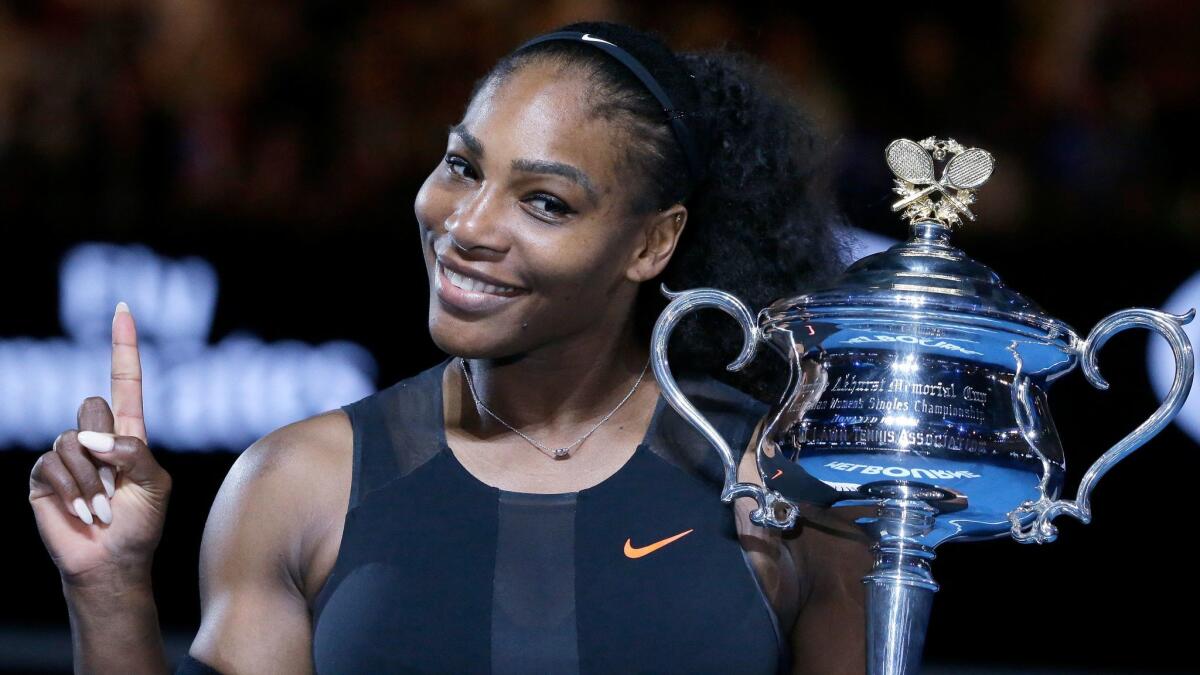Op-Ed: With Serena Williams out, women’s tennis is suddenly an unpredictable Wild West

I’m a longtime tennis writer, age 41, and on my way to Wimbledon with a career addiction that is suddenly extra strong: Women’s tennis.
Read the headlines from afar and this may strike you as impossible. Serena Williams, who is one Grand Slam victory away from tying Margaret Court’s all-time record of 24 titles, is pregnant and taking the rest of the year off. Maria Sharapova is on the sidelines with an injury after returning from a 15-month drug suspension. Angelique Kerber sits atop the rankings despite having stumbled in the first round at the French Open.
All in all, the makings of a miserable tennis year — until you watch. The scrappy group of women who remain is an enthralling reminder that sometimes, when everything seems to go wrong, the tennis season becomes wild, unpredictable and oh-so-fun.
Take the French Open. The first round had 18 three-set matches, including a 13-11 victory in the third set by Madison Brengle. When Kristina Mladenovic struggled, her French fans cheered — then erupted in screams when she survived 9-7 in the third set. Venus Williams carried six straight games to win the first set, but the wily Timea Bacsinszky recovered to take the match. Comebacks and nervous finishes, once rare, were possible at every turn. No one knew who would come out on top; you had a far better chance of picking the winning horse at the Kentucky Derby.
Sometimes, when everything seems to go wrong, the tennis season becomes wild, unpredictable and oh-so-fun.
In the end, the most improbable champion prevailed: Jelena Ostapenko, a 20-year-old from Latvia who had never won a tournament or even survived the third round of a Grand Slam. In the final, she was three games from losing — and then hit the ball harder, missed less often and won. Overall, Ostapenko won five of her seven matches in three sets and hit a stunning 299 winners. “I still cannot believe it,” she said, “because it was my dream and now it came true.”
The men’s matches were mostly dull by comparison. Some early rounds and a tense five-set semifinal between Andy Murray and Stan Wawrinka entertained, but Rafael Nadal dominated. He won every set, losing a mere 35 games in seven matches, the least of his 10-title French Open career. There wasn’t much competition – or excitement.
Women’s tennis used to be even more predictable than men’s. The top-ranked players almost always won, and quickly. Billie Jean King stomped opponents in singles and doubles. Chris Evert won the French Open seven times. Martina Navratilova won 10 Wimbledon titles; in 1983, she lost only one match. Steffi Graf won 22 Grand Slams. Then came Monica Seles, who crushed competitors with two-hand strokes. Serena Williams dominated more than anyone, racking up 23 major titles.
With Williams and Sharapova out, that longstanding dynamic is gone. As the ESPN commentator and former pro Pam Shriver commented in the lead-up to the French Open, “I thought I’d seen some draws in the last 10 years that were wide open on the women’s side, but I’ve never seen a situation like this.” Andre Agassi’s former coach, Brad Gilbert, also marveled, “Almost every week we have a different winner.”
Due to its grass courts, Wimbledon usually favors a strong serve and powerful swings, but anything could happen this year. Petra Kvitova, a two-time Wimbledon champion, just returned from six months off after surviving a harrowing attack at her home in December. (She won the Aegon Classic at Birmingham, England, last month.) Victoria Azarenka, a relentless former No. 1, is returning after giving birth last year. She has won two Grand Slam titles, but never at Wimbledon. Simona Halep, who lost the French Open final, will try again for her first major title, as will the 22-year-old rising star Elina Svitolina. Karolina Pliskova, currently ranked third, will seek her first Wimbledon title, bringing with her the deadliest serve in women’s tennis.
Perhaps the most anticipation surrounds Venus Williams, who will be playing at Wimbledon for the 20th time in her career, mere days after a wrongful-death lawsuit was filed against her over a fatal car accident she was involved in last month. She has won the tournament five times, but not since 2008, her last Grand Slam title. Despite being diagnosed with an autoimmune disorder in 2011, she has hustled and fought, even reaching the Wimbledon semifinals last year. “I’d like to just continue to rise,” she said after getting knocked out of the French Open last month. I can’t wait to watch her — and all the others — try.
Tom Perrotta, an editor at large for Tennis magazine, writes about the sport for the Wall Street Journal.
Follow the Opinion section on Twitter @latimesopinion or Facebook
More to Read
A cure for the common opinion
Get thought-provoking perspectives with our weekly newsletter.
You may occasionally receive promotional content from the Los Angeles Times.










